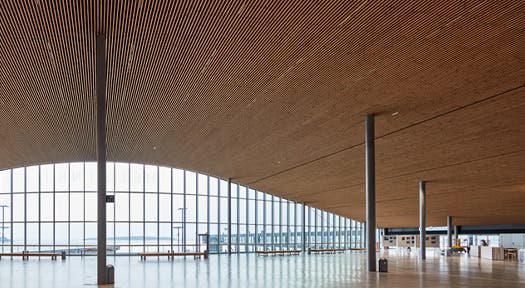Open Office Acoustic Solutions, Designs, and Considerations
Efficient, productive workspaces are a boon to any organization, and open office plans are quickly becoming the trend of the modern workplace. While they do offer many advantages, open office plans have their share of downsides, including noise pollution, which leads to the importance of office acoustic solutions.
If you have an open-plan office, chances are some of your employees might be getting a little bit sore from the noise.
They might be distracting when they chat with colleagues and annoying when they have a loud phone conversation.
Don't get the wrong idea, however. Open office spaces can be both flexible and efficient- when done right.
How modern open-plan designs affect office acoustics
Open-plan offices have become very popular in recent years.
It's easy to see why.
They feel more collaborative than traditional office layouts, promote team spirit and allow for an easier flow of communication.
However, as is often with things that seem too good to be true, it turns out that open-plan offices aren't necessarily all they're cracked up to be.
Studies show that employees working in open-plan settings are less productive than those who work from a private office (we'll talk more about this topic below.)
This demands better office acoustic solutions.
A large part of these open-plan offices' lower productivity levels can be blamed on increased background noise caused by improper acoustics in these office designs.
So, what are some of the potential issues that affect open-plan offices?
Noise: If you have coffee machines, printers, people talking on phones, and people meeting in groups all at once, it can be difficult to focus on anything. It's important to consider how you will deal with this in your design stage.
Confidentiality: A lack of confidentiality can be a big issue that affects employees in open-plan offices. If sensitive conversations are happening nearby (such as job interviews or disciplinary meetings), employees may feel uncomfortable if they can hear everything being said. This can make people feel like they're not welcome or create issues with employee confidence.
Privacy: Many studies suggest people in open-plan offices experience more stress than those working from home or in private cubicles.
The lack of privacy has increased stress levels and reduced productivity.
So, that's why you should care about proper office acoustic solutions…
Good workplace acoustics increases employee productivity.
Office workers exposed to more than 85 decibels noise levels report lower productivity and even hearing problems.
A study has revealed that between 25% and 30% of employees don't like their workplace acoustics.
Also, 70% of those who work in open spaces feel that the conversations of their coworkers are the biggest hindrance to their productivity.
What's worse is that every time employees get distracted, their productivity takes a hit.
It takes an average of 20 minutes to regain concentration on complex tasks once distracted.
Do you need more proof on why you need proper office acoustic solutions?
A lack of proper sound attenuation can result in lower productivity, morale, and even health problems.
Decreased concentration levels and increased stress can lead to fatigue, headaches, and high blood pressure.
A good office acoustic panel system can not only help improve overall acoustics but also decrease noise pollution.
It's smart for any business owner to invest in well-designed office acoustic solutions that boost productivity while increasing comfort levels.

Some open office acoustic solutions
- Think about acoustics from the beginning of the project!
Retrofitting a place to correct bad acoustics is significantly more expensive than addressing acoustics from the start of a project.
So, if it's possible and you get a say in the construction plan, try to think of different office acoustic solutions early on.
A wall separating a break room from workstations, for example, can be created using sound-blocking materials during construction.
An acoustic expert might recommend materials that will accomplish the appropriate level of noise reduction.
Waiting until employees complain about acoustics, on the other hand, may necessitate rebuilding the wall, hanging ceiling tiles, or making other costly and disruptive repairs.
- Set up dedicated work zones
It's not necessary to have total silence in an office setting, and indeed, a little bit of background sound can do wonders for productivity (working bees.)
However, it is essential to provide spaces conducive to focus work, where people can work without interruption.
One key to providing office acoustic solutions is to consider the various kinds of activities that go on in your office area.
So, you need to designate separate work zones within your office layout.
You can set up a different layout for everything you will need.
For example,
- one area with cubicles for employees who spend most of their time on phones and computers;
- another with open tables for workers who need more communal spaces;
- another reserved for meetings and presentations.
With these noise areas separated from one another, you'll be able to control sound (and therefore noise) levels in your open office.
This will ensure that everyone has a private space for demanding work and group space for brainstorming sessions.
- Use sound-absorbing materials
If you spend much time in an open office, you've probably thought about how loud it can be.
One of your best defenses against ambient noise is to install sound-absorbing materials that will help dampen any distracting noises.
You can put up acoustic tile on your walls or put down carpeting on your floors to help reduce ambient sounds.
If other workers are causing most of the distraction, hanging heavy curtains around meeting rooms or near workstations might be a better option.
Or possibly even just putting up some smaller pillows where people tend to gather at lunchtime or to hang out (if you have one.)
- Properly position your office acoustic panels
Once you have decided on a type of acoustic panel, you will need to figure out where to place them.
There are several things to consider: acoustics, visual appeal, functionality, and comfort.
You'll want a space that sounds good but also looks good but also with the proper office acoustic solutions.
Keep in mind that office acoustic panels can be installed horizontally or vertically on ceilings, walls, or suspended from ceilings or floor joists/trusses.
Also, it's crucial to understand that these panels don't block all noise—they absorb sound waves.
You will still be able to hear conversations going on around you; however, you won't have to listen hard to pick out certain words or phrases from those conversations.
That makes office acoustic panels especially useful for conference rooms and areas where multiple employees might be working at one time.
They're also perfect for cubicles that share a common wall with another worker who likes to bring music into their space.
- Install sound masking systems
Like a white noise machine, people use at home, sound masking systems designed for office environments can help reduce distraction by producing low-level background noise.
These systems are installed in ceiling tiles or dropped ceilings and generally include a media player that plays white noise or other soothing sounds (like ocean waves).
Employees may even select their own favorite music, which is then played throughout the day via headphones.
- It makes employees feel less distracted
- it helps filter out disruptive noises;
- it's simple to install;
- it doesn't cost much to operate.

Conclusion
As you can see, there are many different office acoustic solutions that you can implement to get the most out of your open office.
The right strategy depends on the nature and requirements of your workspace. Be sure to consider how the design and layout of your office will support the activities you need to accomplish.
And don't forget those sneaky little annoyances, like overhead room noise and busy hallways.
Because if you overlook them, they'll find a way of getting under your skin—and making it harder for you to concentrate on more pressing matters.











